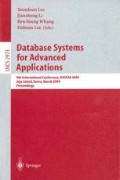Abstract
Most conventional database systems and information retrieval systems force users to specify the qualification conditions in queries in an ”absolute” manner. That is, a user must specify a qualification condition to be satisfied by each retrieval result. To do this properly, users must have sufficient knowledge about the metadata and their structures. In the real world, however, people often specify a qualification in a relative manner such as ”I prefer this one among these.” In this paper, we propose the notion of ”relative queries,” and their query processing method called the ”relative cluster-mapping.” A relative query specifies user’s selection criteria as selecting his/her favorite data among a sample data cluster. This notion is useful when users do not have sufficient knowledge about metadata, or users cannot decide a complete qualification condition. The ”relative cluster-mapping” method maps the relative position of the user-selected data in a sample data cluster to a target data cluster and returns an answer from the target data cluster. The answer‘s relative position in the target data cluster is similar to that of the selected data in a sample data cluster. We believe it is more natural to express the desired data using relative qualifications. We also have developed prototype system, and evaluated its appropriateness.
Access this chapter
Tax calculation will be finalised at checkout
Purchases are for personal use only
Preview
Unable to display preview. Download preview PDF.
References
Google, http://www.google.com/
Yahoo!, http://www.yahoo.com/
Geman, D., Moquet, R.: A stochastic feedback model for image retrieval. In: Proc. RFIA 2000, Paris (2000)
Rui, Y., Huang, T., Mehrotra, S.: Relevance Feedback Techniques in Interactive Content-Based Image Retrieval. In: Storage and Retrieval for Image and Video Databases (SPIE), San Jose, California, USA, January 1998, pp. 25–36 (1998)
Cox, I.J., Miller, M.L., Omohundro, S.M., Yianilos, P.N.: PicHunter: Bayesian Relevance Feedback for Image Retrieval. In: Proc. Int. Conf. on Pattern Recognition, Vienna, Austria, August 1996, vol. C, pp. 361–369 (1996)
Author information
Authors and Affiliations
Editor information
Editors and Affiliations
Rights and permissions
Copyright information
© 2004 Springer-Verlag Berlin Heidelberg
About this paper
Cite this paper
Nakajima, S., Tanaka, K. (2004). Relative Queries and the Relative Cluster-Mapping Method. In: Lee, Y., Li, J., Whang, KY., Lee, D. (eds) Database Systems for Advanced Applications. DASFAA 2004. Lecture Notes in Computer Science, vol 2973. Springer, Berlin, Heidelberg. https://doi.org/10.1007/978-3-540-24571-1_74
Download citation
DOI: https://doi.org/10.1007/978-3-540-24571-1_74
Publisher Name: Springer, Berlin, Heidelberg
Print ISBN: 978-3-540-21047-4
Online ISBN: 978-3-540-24571-1
eBook Packages: Springer Book Archive

